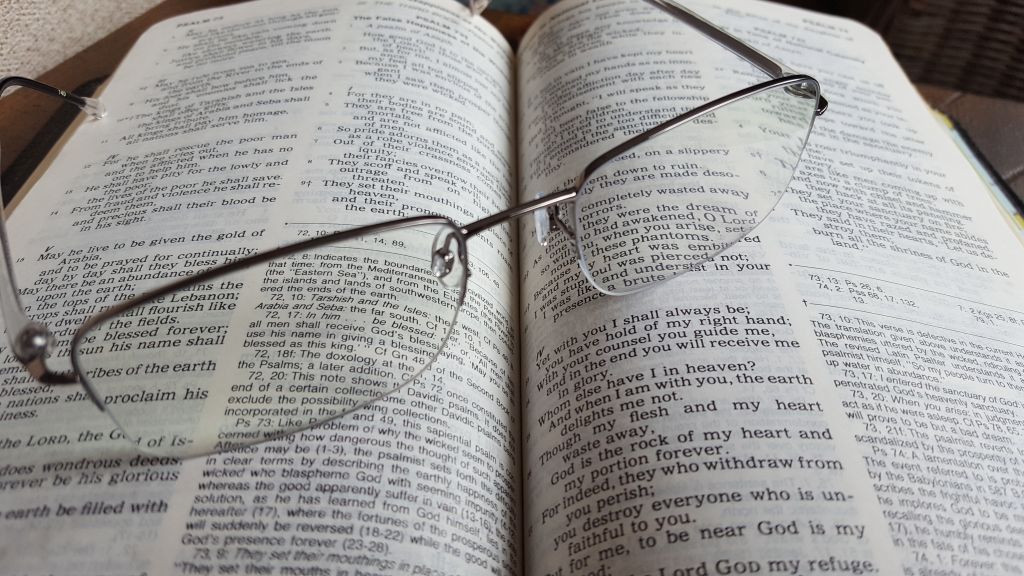
What is it about deer? Whenever you see one, you almost automatically exclaim, “Oh, look. A deer!” Funny how that always seems to be the case. (And then that song from The Sound of Music pops into your head – Doe, a deer, a female deer…. Read More

What is it about deer? Whenever you see one, you almost automatically exclaim, “Oh, look. A deer!” Funny how that always seems to be the case. (And then that song from The Sound of Music pops into your head – Doe, a deer, a female deer…. Read More

At the far end of our backyard is a pond. I often sit on our deck in silence, as there I am able to take in all of the beautiful sights and sounds of nature. Read More

Growing up, I was quite an inquisitive child. There were always questions that I needed answered. Questions like:
Read More

Temptation often seeks us out, typically without any involvement on our part. We can be just going about our own business when all of a sudden, WHAM! Temptation strikes us right where we stand. Read More

Last week, my wife and I had the pleasure of babysitting our grandson while his parents took a well-deserved mini get-away respite. After years of not having toddlers around, I have to admit that I was a bit rusty. Read More
I read this story from a post on LinkedIn written by Hiram Figueroa Jr. It’s a love story – and it will truly touch your heart.

During the first week of Lent, I listened to an audio book from Archbishop Desmond Tutu titled, ‘God Has A Dream.’ In that book, he makes this enlightening statement:
“Pray as you can – not as you can’t.”
He refers to the times when we are so exhausted that we can barely function, and we do not have the energy to give God our fullest attention.
The point is that we should not just give up or neglect prayer altogether because of our physical state of being. What we need to do is open up a dialogue with God letting him know that we don’t have it in us right now for “full-blown” prayer. Simply stating this to our heavenly Father is indeed a prayer in-and-of-itself. The purpose is to pray as you can – in the condition that you are. It doesn’t have to be a 15-minute litany. A simple prayer will do just as well. For it is better to pray short and simple than to not pray at all.
What we need to do is something that my spiritual director has told me for years. Instead of stressing over the fact that we cannot manage to pray in the manner that we would prefer, we just need to say something like this:
“Father, I am too exhausted right now to give you my complete attention or the praise that you rightly deserve. I will make the time to speak with you later. Until then, please continue to watch over me and keep me safe. Amen.”
Our intentions may always be good, but the body is often too weak. So, don’t be afraid to ask God to have the patience with us if we fall asleep in the middle of our prayer. There is nothing to be ashamed of if you fall asleep during prayer. As I always say, what better way to fall asleep than in the arms of our loving Father.
Don’t let exhaustion or extreme busyness pull us away from prayer. Make the effort to keep that line of communication with God always open and active. Remember, pray hardest when it’s hardest to pray and you will find true peace this Lenten season. Amen.
It’s the night of the last supper. Jesus has shared a meal with his disciples, washed their feet, given them a new commandment to love as he loves, and told them of his leaving. Now he prays. In today’s gospel (John 17:20-26) we overhear a portion of his prayer to his Father. He prays for us and asks that we would all become one as he and the Father are one.
If Jesus is praying for our oneness, then he is also recognizing and rejecting the boundaries and differences that divide us. There are divisions within ourselves, our families, our churches, our nation. We live in a world full of divisions – male or female; rich or poor; gay or straight; Christian or Muslim; conservative or liberal. We could go on and on, but for every boundary we establish there is a human being. Ultimately, boundaries and differences are not about issues. They are about real people, with names, lives, joys, sorrows, concerns, and needs just like us. I think we sometimes forget or ignore this. It is easier to deal with an issue than a real person.
 We often deal with the boundaries and differences that divide us by writing agreements, covenants, and legislation that govern how we will get along with each other and behave in the midst of our differences. But that is not Jesus’ prayer.
We often deal with the boundaries and differences that divide us by writing agreements, covenants, and legislation that govern how we will get along with each other and behave in the midst of our differences. But that is not Jesus’ prayer.
Jesus does not pray for our tolerance, our getting along, or just being nice to each other. He does not even pray that our differences would be eliminated. Instead he prays for our oneness. He prays that we would be one as he and the Father are one so that our oneness would be the revelation of God’s presence to the world.
Oneness is not about eliminating differences. It’s all about love. God loves us the same as he loves Jesus. God loves our neighbor the same as he loves Jesus. God loves our enemy the same as he loves Jesus. If that is how God loves, how can we do anything less and still call ourselves Catholic-Christians?
Even though Jesus is praying to the Father, you and I will be the ones to answer Jesus’ prayer – and we answer it every time we choose who to love, where to love, when to love and how to love.
How can this be? Those four short words make up one of the most famous questions in all of Scripture – and it’s also a question that I find myself thinking a lot about this Advent.